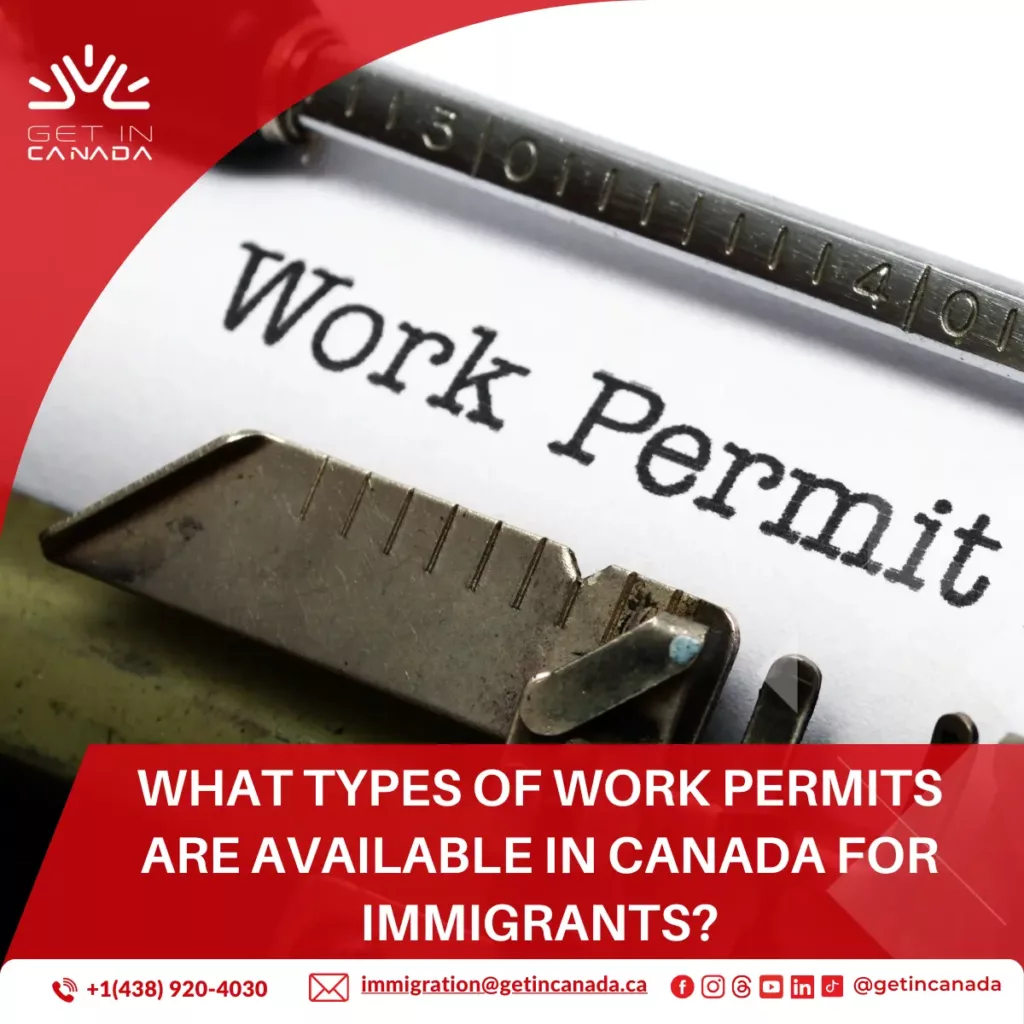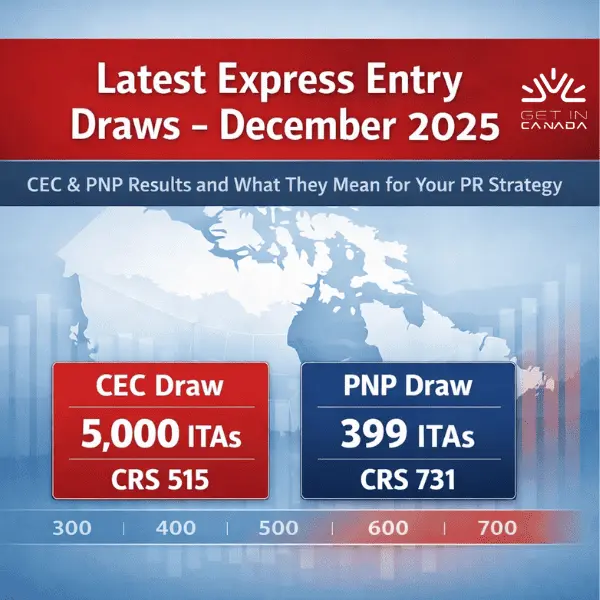What types of work permits are available in Canada for immigrants?
Embarking on a new chapter in a different country often involves navigating the intricacies of work permits. In our blog, we delve into the diverse landscape of Canadian work permits, exploring the options available to immigrants. Whether you’re a skilled professional, a recent graduate, or someone seeking opportunities in the Great White North, join us on a journey through the various types of work permits that Canada offers, unraveling the pathways to employment for immigrants.

What are the eligibility guidelines for working in Canada?
Though exceptions exist, most foreign nationals need a permit to work in Canada. To apply for a work permit, candidates generally require a Canadian job offer backed by a Labour Market Impact Assessment (LMIA). Exceptions include recent graduates from Canadian Designated Learning Institutes (DLIs) or spouses of those with Canadian work or study permits. Eligible candidates must also meet criteria like demonstrating intent to leave after work authorization expires, proving financial support, being admissible to Canada, planning to work with an eligible employer, and providing necessary documents.
Varieties of Canadian work permits
Canadian work permits come in diverse forms, each with its unique requirements. Some necessitate a job offer, others mandate a Labour Market Impact Assessment (LMIA), and some rely on connections to Canada, such as previous education or spousal sponsorship. Refer to the categories below to identify the work permit that aligns best with your qualifications:
Requiring a Labour Market Impact Assessment (LMIA)
- Temporary Foreign Worker Program (TFWP)
- Facilitated LMIA (Quebec)
- Global Talent Stream
LMIA-Exempt but requiring a job offer or employment contract
- International Mobility Program (IMP)
- NAFTA Work Permits
- CETA Work Permits
- Intra-Company Transfers
Open work permits (no job offer or LMIA required)
- Post-Graduation Work Permits (PGWP)
- Spousal Sponsorship from Inside of Canada
- International Experience Canada (IEC) (working holiday visa)
- Bridging Open Work Permit (BOWP)
- Spouse Accompanying International Student or Worker
Find out if you are eligible to get in Canada →
Canadian work permit process
Obtaining a Canadian work permit involves a diverse process, varying based on the specific type of permit sought. For instance, international students in Canada often receive automatic part-time work authorization alongside their study permit.
In most cases, closed work permit applications necessitate an official job offer from a Canadian employer supported by a Labour Market Impact Assessment (LMIA). Even for those exempt from LMIA requirements or work permits, understanding the unique documentation needed to enter Canada is crucial. There are two primary pathways for securing a Canadian work permit: a closed (restricted) work permit and an open work permit.
Closed work permits tie individuals to specific employers, requiring them to stay with the same employer at the same location unless a work permit change is initiated.
Inclusion of family or your spouse and dependents in your work permit application
When applying for a work permit supported by an employer, there’s a possibility to include your spouse and dependent children in the application.
If your school-aged children are in Canada, they can attend Canadian educational institutions without the need for a separate study permit. Additionally, your spouse or partner may qualify for an open work permit, enabling them to work for any employer in Canada.
When applying for a closed Canadian work permit, your spouse can potentially obtain an open work permit. If eligible, your spouse must apply for their work permit, usually through online application processes in most cases.
What are the Canadian work permit fees?
The cost of a Canadian work permit varies based on its type. For a closed work permit, the processing fee is CAD 155 per person, while an open work permit incurs a fee of CAD 255 per person. If you’re restoring a work permit or applying as a group of performing artists, additional fees will be applicable.
What are the required documents to apply for a Canadian work permit?
The documents needed for a Canadian work permit application vary depending on the type of permit sought. Applicants may be required to submit the following documents:
- Completed application forms
- Proof of status in Canada (if applicable)
- Family member’s proof of status (if applicable)
- Labour Market Impact Assessment (if applicable)
- Written offer of employment (if applicable)
- CV/ résumé
- Marriage certificate (if applicable)
- Certificat d’acceptation du Québec (CAQ) (if applicable)
- Proof that you meet the job requirements
- Valid copy of your passport
- Copy of education credential
- Medical exam results (if requested)
- Evidence of financial means to stay in Canada and return to home country
- Proof of payment for applicable government fees
- Recent passport-sized photos
Requirements for Canadian work permits: Biometrics, Police Clearances, and Medical Exams
Biometrics for Canadian Work Permits:
IRCC has a temporary exemption for work permit applicants within Canada, while those outside must provide biometrics upon receiving an instruction letter. Follow the government’s instructions for biometrics on their dedicated page.
Police Clearances for Canadian Work Permits:
Visa officers may request police clearance certificates, depending on your application location. Work permit applicants may need clearances from countries lived in for 6+ months after age 18.
Medical Exam for Canadian Work Permits:
Depending on intended stay length, residence, and occupation, foreign nationals may require a medical exam. For stays under 6 months, it’s generally not needed unless the job involves close contact with people or is agriculture-related. Longer stays may necessitate an exam based on residency or job criteria. Applicants can opt for an upfront medical exam, coordinating with a designated panel physician found on IRCC’s webpage. If not submitted with the application, IRCC provides instructions and a deadline for later completion.
What is the processing time of the work permit application?
The duration of processing for a work permit application varies based on the permit type and the applicant’s residence country during the application. Processing times can span from a few weeks to several months.
What is the LMIA application processing time?
The processing time for Labour Market Impact Assessment (LMIA) applications hinges on the type—regular or simplified. The simplified LMIA is exclusive to Quebec. Regular LMIA processing occurs on a case-by-case basis, with response times varying. Typically, a minimum of five months is required for a regular LMIA application.
Employers eligible for Canada’s Global Talent Stream may benefit from expedited LMIA processing. The simplified LMIA for Quebec employment is generally processed within approximately two to three months.
Can I obtain a Canadian work permit without a job offer?
Typically, foreign nationals seeking to work in Canada need a written job offer from a Canadian employer to apply for a work permit. Nevertheless, specific circumstances may permit foreign workers to apply for an open work permit, allowing them to work anywhere in Canada for any employer, even without a specific job offer.
Language Requirements for Canadian work permits
Applying for a Canadian work permit doesn’t mandate the IELTS or any language exam. However, if the job offer necessitates French and/or English skills, and the applicant is from a non-French or English country, providing evidence of language abilities—such as a language test—may be required by the reviewing officer.
What is the process of employer support for working in Canada?
Canadian employers don’t technically “sponsor” candidates to work in Canada, but they can facilitate the hiring of foreign workers by obtaining a Labour Market Impact Assessment (LMIA) or submitting an electronic job offer (LMIA-exempt categories).
For any Canadian employer looking to hire a foreign worker, obtaining an LMIA or submitting an electronic job offer is a requirement. Once an employer secures an LMIA or the “A” number (electronic job offer), it becomes a crucial step in applying for a Canadian work permit.
The blog explored various types of work permits available in Canada for immigrants, highlighting the diverse opportunities the country offers. From closed permits tied to specific employers to open permits providing flexibility, each option caters to unique circumstances. The guide emphasized the importance of understanding these pathways for immigrants seeking employment in Canada, encouraging informed decision-making. The conclusion underscored the richness of opportunities and the welcoming atmosphere for those embarking on a Canadian work permit journey, acting as a companion for informed and successful career endeavors.











